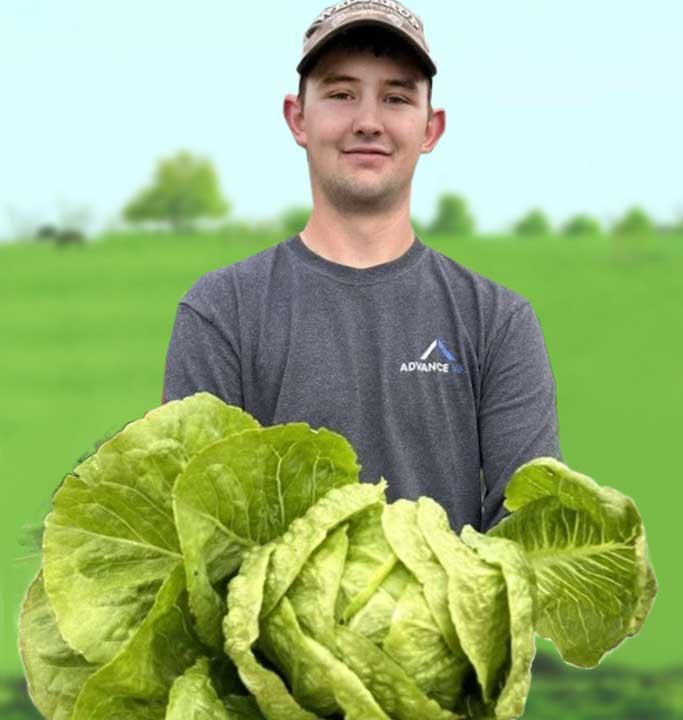
While most of his classmates at Morehead State University have relaxed this summer, Taylor Whitley has worked on the family farm in Elliott County. Part of Whitley’s motivation to grow five acres of fresh produce to sell at the Elliott County Farmers’ Market is to help pay for college. He is a junior majoring in animal science.
Elliott County producer uses farmers’ market success to help pay for college
By Chris Aldridge
Kentucky Ag News
While most of his classmates at Morehead State University have relaxed this summer before the fall semester begins Aug. 19, Taylor Whitley has worked on the family farm in Elliott County.
“They (peers) are worried about getting gas for their cars and running around,” Whitley said. “I’m worrying about things a little bit different. I’m hoping for rain and making sure that I have enough diesel (fuel) for the tractor.”
Whitley, 20, admits being a farmer – even part-time while attending college during fall harvest and spring planting – “is a hard thing to do.
“I understand everybody doesn't want to,” he added. “You have to grow up really quick. But if it's in your blood, it causes you to just absolutely want to.”
Part of Whitley’s motivation to grow five acres of fresh produce to sell at the Elliott County Farmers’ Market is to help pay for college. He is a junior majoring in animal science.
“I just enjoy it, and there's a lot of money to be made with it and I can help my parents out,” he said. “They’ve always supported me in everything, but I didn't feel like they should be paying for all my college.”
Helping pay his way is one of the reasons Whitley started selling produce in the first place.
“When I was younger, I was a big-time trap shooter, and it’s not a cheap sport,” he said. “One day, my dad said, ‘Maybe you ought to do something that'll pay for it.’ We had some extra produce that year, and he said, ‘Maybe you ought to sell it at the farmers’ market.’ So we tried it.”
Taylor sold green beans, a couple dozen ears of corn, and some potatoes and tomatoes. His net profit was $30.
“We were just kind of getting our feet wet, and after that, we really stepped it up,” he said. “It kind of became a hobby.
“It's just been amazing. At the farmers’ market, you learn how to market your stuff, and you may pick up a few tips from other vendors on how they grow theirs.”
Taylor’s specialty is sweet corn. But drought conditions in eastern Kentucky have wreaked havoc on this year’s crop.
“We planted 1,000 (plants) this year, but we’ll be lucky to get something,” he said, noting he usually plants half as many. “It (corn) really took a hard hit this year.”
Taylor is also growing about 270 tomato plants, as well as cucumbers, beans, potatoes, lettuce, broccoli, and zucchini.
For the first time, Taylor is also growing a small pumpkin patch. “We're just going to test the waters,” he said.
“Taylor has been selling at the farmers’ market ever since he was a kid,” said Sharon Spencer, director of the Kentucky Department of Agriculture’s Direct Farm Marketing Division. “I met him at a regional farmers’ market training, and he’s a very impressive young man. So proud of him.”
Taylor didn’t let youth stop him from becoming the leader of the Elliott County Farmers’ Market.
“I think I was the youngest farmers’ market vendor in the state,” he told The Farmer’s Pride publication, “and I know I was the youngest market manager.”
Taylor began managing the market before he could drive at age 15, but his age limited him to the title of “co-manager.” “Because I was so young, I couldn't sign the checks,” he noted.
Taylor has managed the market ever since. Next February, when he turns 21, the “co” will no longer be necessary.
Influenced by a family of beef cattle farmers with large produce gardens, including his father and grandfather, Taylor always wanted to follow in their footsteps. But instead of farming full-time, he dreams of working as a county agent for the University of Kentucky Cooperative Extension Service.
“We had an Extension agent (Keith Center) here (in Elliott County), and he took me under his wing and showed me the ropes on everything, and I just ate it up,” said Taylor, noting he also has a close relationship with Center’s successor, Jacob Ison. “They’ve both impacted my life greatly, and I appreciate everything they've done for me.
“That's all I want to do,” Taylor added. “I feel like Extension is kind of the right fit for me. You can work with kids, and you can work with older farmers.”

